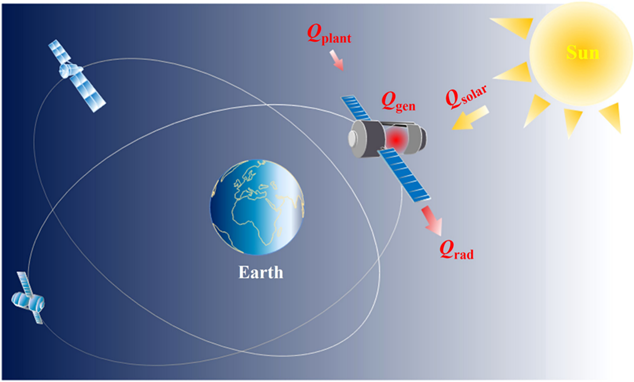Space race heats up: advanced electronics cooling systems for spacecraft
Published 06 June, 2024
A recent review focuses on the development and optimization of thermal management technologies (TMTs) for spacecraft electronics. These technologies address the challenges of heat acquisition, transport, and rejection in the harsh space environment. The review aims to guide future spacecraft thermal management systems, ensuring the reliability and performance of space missions.
Spacecraft electronics operate under extreme conditions, facing issues like microgravity, thermal cycling, and space radiation. These factors necessitate robust thermal management solutions to maintain the functionality and longevity of onboard equipment. Traditional thermal control methods often fall short in addressing these challenges. Based on these challenges, there is a need to conduct in-depth research on advanced thermal management technologies to ensure the stability and efficiency of space missions.
A comprehensive review (DOI: 10.1016/j.enss.2024.03.001) by researchers from Xi’an Jiaotong University and the Xi’an Institute of Space Radio Technology, published in Energy Storage and Saving on March 28, 2024, delves into advanced thermal management technologies for spacecraft electronics. The study categorizes these technologies based on heat transfer processes, including heat acquisition, transport, and rejection.
The review evaluates thermal management technologies (TMTs) for spacecraft electronics, focusing on heat acquisition, transport, and rejection. It explores high thermal conductance materials like carbon-based composites and annealed pyrolytic graphite (APG) and discusses novel packaging structures using micro-/nano-electromechanical system (MEMS/NEMS) technologies. Heat transport solutions, including various heat pipes and mechanically pumped fluid loops (MPFLs), are examined, with heat pipes categorized into unseparated and separated types. Advanced microfluidic cooling techniques for efficient heat removal are also highlighted. For heat rejection, the review focuses on deployable radiators, variable emissivity radiators, and phase change materials (PCMs), addressing the fluctuating thermal environment in space to ensure effective heat dissipation.
Dr. Wen-Xiao Chu, the corresponding author of the study, states, "Our review highlights the critical advancements in thermal management technologies that are essential for the success of future space missions. By addressing the unique thermal challenges in the spacecraft environment, these technologies ensure the reliability and performance of onboard electronics, paving the way for more ambitious space exploration and satellite missions."
Advancements in thermal management technologies have significant implications for the space industry. By ensuring efficient heat control, these technologies enhance the reliability and lifespan of spacecraft electronics, crucial for long missions. Lightweight and high-performance TMTs improve overall efficiency and cost-effectiveness. As demand for high-power and miniaturized space systems grows, implementing these advanced thermal solutions is vital for the future of space exploration and satellite technology.
Reference
|
Title of the original paper
|
Review on Thermal Management Technologies for Electronics in Spacecraft Environment
|
|
Journal |
Energy Storage and Saving (ENSS) is an interdisciplinary, open access journal that disseminates original research articles in the field of energy storage and energy saving. The aim of ENSS is to present new research results that are focused on promoting sustainable energy utilisation, improving energy efficiency, and achieving energy conservation and pollution reduction.
|
|
DOI |
10.1016/j.enss.2024.03.001 |

Image title: Schematic of the thermal environment for electronics in spacecraft.
Image caption: Schematic of the thermal environment for electronics in spacecraft.
Image link: https://ars.els-cdn.com/content/image/1-s2.0-S277268352400013X-gr1_lrg.jpg
Image credit: The authors
License type: CC BY-NC-ND 4.0
Funding information:
The work is financially supported by the National Science Foundation of China No. 52206113, and the Science Fund Program for Distinguished Young Scholars (Overseas), No. GYKP020.
Media contact:
Name: Yue Yang
Email: enss@xjtu.edu.cn